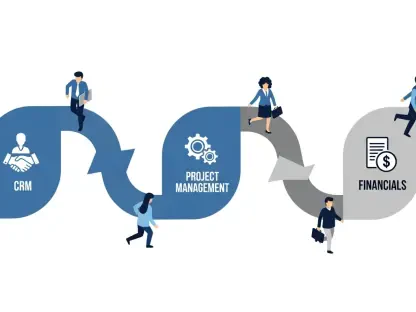As the push for rapid software development and deployment intensifies, the need for efficient and reliable software testing tools becomes more critical than ever before. Traditional manual testing methods, while effective, have their limitations—primarily due to the extensive time and resources they require. In response, the software testing industry has seen a shift towards automating these processes, leveraging advanced technologies to enhance testing efficiency and accuracy. Among these technologies, Artificial Intelligence (AI) and Low-Code/No-Code tools have emerged as game-changers, bringing about unprecedented transformations in the way software testing is conducted.
Artificial Intelligence, particularly through its machine learning capabilities, has significantly impacted the realm of software testing by automating complex tasks that were previously reliant on human effort. AI-powered tools can predict potential defects, generate test cases autonomously, and monitor code changes—all with minimal human intervention. This level of automation reduces the time required for testing phases while also improving the accuracy and reliability of the results. DevAssure, a leading entity in this transformation, demonstrates the potential of AI in creating more efficient testing protocols, allowing companies to meet high-quality standards while adhering to tight deadlines.
Integration of AI in Software Testing
Artificial Intelligence (AI) has transformed the traditional landscape of software testing through its ability to learn and adapt from historical data. By employing machine learning algorithms, these AI-driven tools can predict possible software defects and automate the generation of test cases. This prediction is not arbitrary; it is based on patterns recognized in vast datasets of previous testing results, thereby minimizing human errors and enhancing the reliability of the software. The beauty of AI lies in its self-learning capabilities, making it more efficient with each iteration, consequently reducing the time needed for future testing phases.
Additionally, the use of AI in software testing goes beyond mere defect prediction. AI technologies can autonomously generate and execute test scripts, effectively reducing the need for manual scripting, which is often time-consuming and labor-intensive. AI’s role in test automation extends to monitoring code changes as well. It can identify and mitigate potential issues arising from these changes in real-time, ensuring that the software maintains its integrity throughout the development cycle. This continuous monitoring and real-time testing help in significantly slashing the time required for testing, allowing for quicker release cycles and more reliable software.
The Role of Low-Code and No-Code Platforms
Alongside AI, Low-Code and No-Code platforms are revolutionizing the software testing industry by making it more accessible to non-technical users. These platforms leverage visual interfaces and simplified tools such as drag-and-drop functionalities to enable users without extensive coding knowledge to participate in the software testing process. This democratization of testing allows business analysts, domain experts, and even stakeholders to contribute directly to quality assurance, fostering greater collaboration and understanding between development and testing teams.
Low-Code and No-Code platforms play a crucial role in bridging the gap between technical and non-technical team members. By providing a user-friendly interface, these platforms enable a broader range of individuals to create and execute test cases without needing deep programming expertise. This inclusivity not only speeds up the testing process but also ensures that the software meets various user needs and expectations, as more individuals with different perspectives and expertise are involved. DevAssure’s Low-Code AI-driven test automation solution serves as a prime example of how these platforms eliminate the need for extensive scripting skills, making testing more inclusive and efficient.
Synergy between AI and Low-Code Platforms
The convergence of Artificial Intelligence and Low-Code/No-Code platforms signals a profound shift in the software testing paradigm, marked by enhanced efficiency, reduced costs, and a more collaborative approach. AI’s predictive analytics and self-healing capabilities seamlessly integrate with low-code platforms’ accessibility, creating a powerful synergy that streamlines development cycles. This integration not only shortens the time-to-market for software products but also cuts down on operational expenses by reducing the need for extensive manual testing and scripting expertise.
The synergy between AI and Low-Code tools empowers organizations to tackle bottlenecks in their development cycles more effectively, ensuring a smoother, faster transition from development to deployment. Companies adopting these technologies are experiencing significant improvements in their operations, including accelerated time-to-market, fewer bottlenecks, and lower operational costs, ultimately boosting their competitiveness in the digital age. The collaborative nature of these tools enables a wider range of stakeholders to be involved in the testing process, ensuring that the end product is of high quality and meets diverse user expectations.
Future Considerations and Actionable Steps
As the push for rapid software development and deployment grows, efficient and reliable software testing tools are more crucial than ever. Traditional manual testing methods, though effective, demand significant time and resources. In response, the industry has shifted towards automating these processes, utilizing advanced technologies to enhance efficiency and precision. Artificial Intelligence (AI) and Low-Code/No-Code tools have emerged as pivotal, revolutionizing software testing.
AI, especially with its machine learning capabilities, has notably influenced software testing by automating intricate tasks previously dependent on human intervention. AI-powered tools can foresee potential defects, autonomously generate test cases, and monitor code changes, all requiring minimal human input. This automation shortens the testing phases while boosting accuracy and reliability.
A key player in this shift is DevAssure, demonstrating AI’s potential to create efficient testing protocols. This advancement helps companies uphold high-quality standards and meet tight deadlines, showcasing how AI can transform software testing processes fundamentally.









